中英文版戏剧评分标准翻译
- 格式:docx
- 大小:21.59 KB
- 文档页数:1

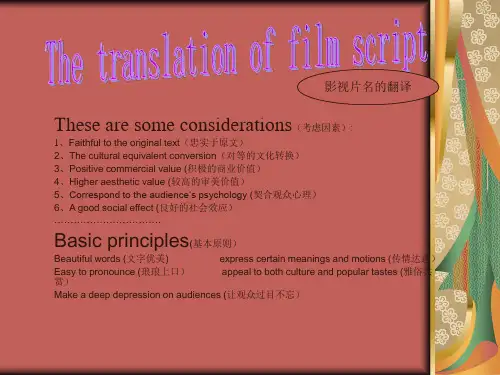
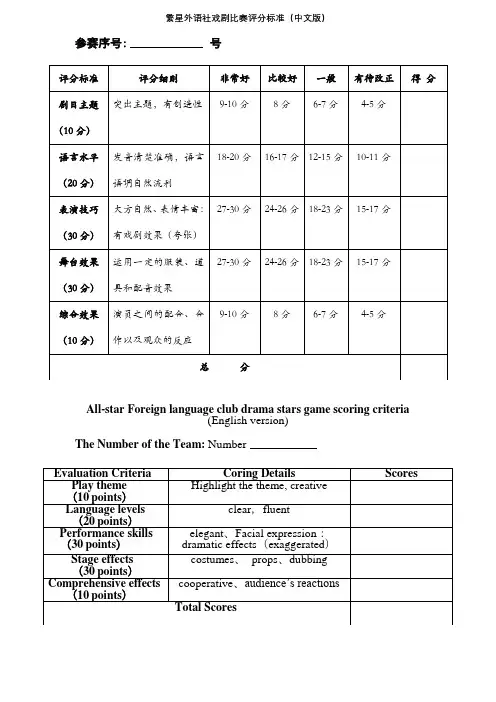
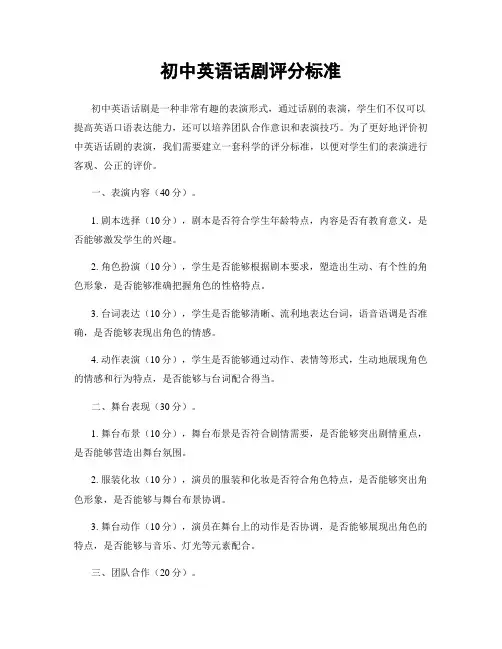
初中英语话剧评分标准初中英语话剧是一种非常有趣的表演形式,通过话剧的表演,学生们不仅可以提高英语口语表达能力,还可以培养团队合作意识和表演技巧。
为了更好地评价初中英语话剧的表演,我们需要建立一套科学的评分标准,以便对学生们的表演进行客观、公正的评价。
一、表演内容(40分)。
1. 剧本选择(10分),剧本是否符合学生年龄特点,内容是否有教育意义,是否能够激发学生的兴趣。
2. 角色扮演(10分),学生是否能够根据剧本要求,塑造出生动、有个性的角色形象,是否能够准确把握角色的性格特点。
3. 台词表达(10分),学生是否能够清晰、流利地表达台词,语音语调是否准确,是否能够表现出角色的情感。
4. 动作表演(10分),学生是否能够通过动作、表情等形式,生动地展现角色的情感和行为特点,是否能够与台词配合得当。
二、舞台表现(30分)。
1. 舞台布景(10分),舞台布景是否符合剧情需要,是否能够突出剧情重点,是否能够营造出舞台氛围。
2. 服装化妆(10分),演员的服装和化妆是否符合角色特点,是否能够突出角色形象,是否能够与舞台布景协调。
3. 舞台动作(10分),演员在舞台上的动作是否协调,是否能够展现出角色的特点,是否能够与音乐、灯光等元素配合。
三、团队合作(20分)。
1. 配合默契(10分),演员之间是否能够默契配合,是否能够相互配合,是否能够保持整体的和谐。
2. 团队组织(10分),导演、舞美、服装化妆等各个团队是否能够有序协作,是否能够保证整个表演的顺利进行。
四、整体效果(10分)。
1. 观赏性(5分),整个表演是否能够吸引观众,是否能够给人留下深刻印象。
2. 教育意义(5分),整个表演是否能够传递出积极的教育意义,是否能够对学生产生积极的影响。
以上就是初中英语话剧评分标准,希望能够对评价初中英语话剧表演提供一些参考,同时也希望学生们在表演中能够充分发挥自己的才华,展现出最好的一面。
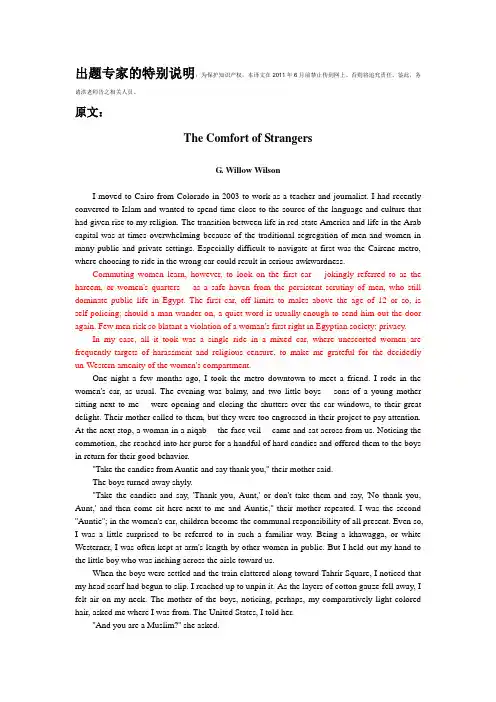
出题专家的特别说明:为保护知识产权,本译文在2011年6月前禁止传到网上。
否则将追究责任。
鉴此,务请洪老师告之相关人员。
原文:The Comfort of StrangersG. Willow WilsonI moved to Cairo from Colorado in 2003 to work as a teacher and journalist. I had recently converted to Islam and wanted to spend time close to the source of the language and culture that had given rise to my religion. The transition between life in red-state America and life in the Arab capital was at times overwhelming because of the traditional segregation of men and women in many public and private settings. Especially difficult to navigate at first was the Cairene metro, where choosing to ride in the wrong car could result in serious awkwardness.Commuting women learn, however, to look on the first car -- jokingly referred to as the hareem, or women's quarters -- as a safe haven from the persistent scrutiny of men, who still dominate public life in Egypt. The first car, off limits to males above the age of 12 or so, is self-policing; should a man wander on, a quiet word is usually enough to send him out the door again. Few men risk so blatant a violation of a woman's first right in Egyptian society: privacy.In my case, all it took was a single ride in a mixed car, where unescorted women are frequently targets of harassment and religious censure, to make me grateful for the decidedly un-Western amenity of the women's compartment.One night a few months ago, I took the metro downtown to meet a friend. I rode in the women's car, as usual. The evening was balmy, and two little boys -- sons of a young mother sitting next to me -- were opening and closing the shutters over the car windows, to their great delight. Their mother called to them, but they were too engrossed in their project to pay attention. At the next stop, a woman in a niqab -- the face veil -- came and sat across from us. Noticing the commotion, she reached into her purse for a handful of hard candies and offered them to the boys in return for their good behavior.''Take the candies from Auntie and say thank you,'' their mother said.The boys turned away shyly.''Take the candies and say, 'Thank you, Aunt,' or don't take them and say, 'No thank you, Aunt,' and then come sit here next to me and Auntie,'' their mother repeated. I was the second ''Auntie''; in the women's car, children become the communal responsibility of all present. Even so, I was a little surprised to be referred to in such a familiar way. Being a khawagga, or white Westerner, I was often kept at arm's length by other women in public. But I held out my hand to the little boy who was inching across the aisle toward us.When the boys were settled and the train clattered along toward Tahrir Square, I noticed that my head scarf had begun to slip. I reached up to unpin it. As the layers of cotton gauze fell away, I felt air on my neck. The mother of the boys, noticing, perhaps, my comparatively light-colored hair, asked me where I was from. The United States, I told her.''And you are a Muslim?'' she asked.''Yes,'' I answered.She praised God, and I dutifully repeated her words, smiling; I understood that a convert in a head scarf was unusual.As I rewrapped my scarf, however, I heard a chorus of hisses. I looked up in alarm. A boy of 16 or 17 was making his way through the car, selling boxes of tissues. I blushed, feeling certain that the other women were reprimanding me for taking off my scarf in the presence of a man. After two years in Egypt, I had developed a sense of humor about my inevitable social gaffes, but they were still embarrassing. Looking around, however, I realized that the scolding wasn't for me after all. The tissue seller was the target of the women's censure.''What are you thinking? Don't you have shame?''''You're too old to be in the women's car, Son.''''Look away, for God's sake.''The tissue seller went red, muttered something in response and turned into the doorway, trying to appear casual. I hastily repinned my scarf. The boy was probably just trying to do better business: he would get more sympathy in the women's compartment than in the mixed cars. Nevertheless, he retreated down the train at the next stop.At that moment, I was grateful to be part of the floating world of the women's car. In that small corner of a culture so different from my own, culture itself ceased to matter. For a few station stops I carried no baggage -- no problematic nationality, no suspect political agenda. I was simply a woman among other women and worth defending because we shared that much. Regardless of the many factors that might separate us on the street, in the women's car my fellow passengers felt I had the same right to privacy as they did. I left the metro feeling secure in much more than the arrangement of my head scarf.(853)From the Lives in NewYork Times, May 31, 2005。
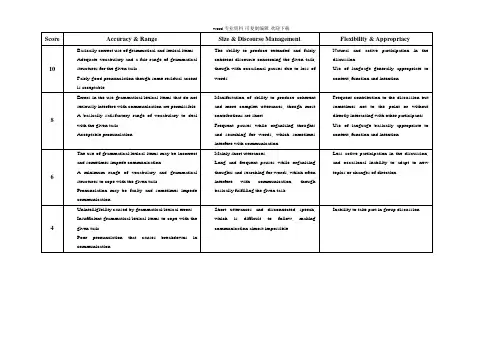
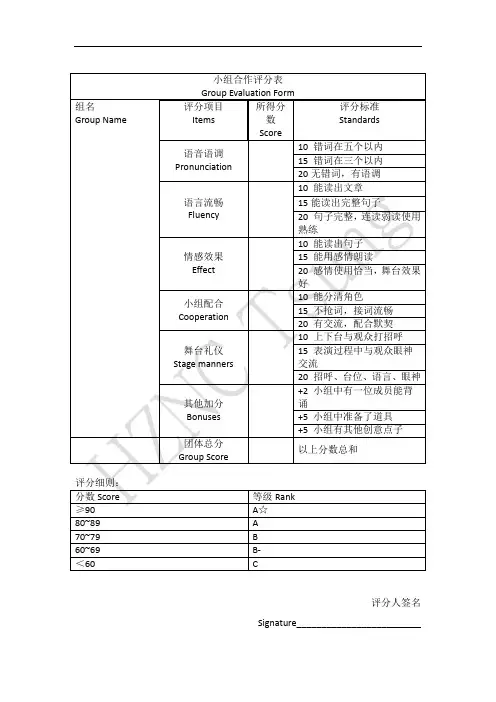
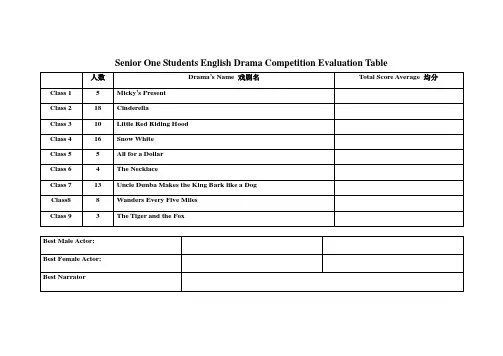
Senior One Students English Drama Competition Evaluation TableSenior One Students English Drama Competition Evaluation TableClass: 1 Drama’s Name: Micky’s Present Number of Participants 5况选择2个最佳男演员和2个最佳女演员和一个最佳旁白,并给出其分数)Senior One Students English Drama Competition Evaluation TableClass: 2 Drama’s Name: Cinderella Number of Participants 18况选择2个最佳男演员和2个最佳女演员和一个最佳旁白,并给出其分数)Senior One Students English Drama Competition Evaluation TableClass: 3 Drama’s Name: Little Red Riding Hood Number of Participants 5况选择2个最佳男演员和2个最佳女演员和一个最佳旁白,并给出其分数)Senior One Students English Drama Competition Evaluation TableClass: 4 Drama’s Name: Snow White Number of Participants 5况选择2个最佳男演员和2个最佳女演员和一个最佳旁白,并给出其分数)Senior One Students English Drama Competition Evaluation TableClass: 5 Drama’s Name: All for a Dollar Number of Participants 5况选择2个最佳男演员和2个最佳女演员和一个最佳旁白,并给出其分数)Senior One Students English Drama Competition Evaluation TableClass: 6 Drama’s Name: The Necklace Number of Participants 4况选择2个最佳男演员和2个最佳女演员和一个最佳旁白,并给出其分数)Senior One Students English Drama Competition Evaluation TableClass: 7 Drama’s Name: Uncle Dunba Makes the King Bark like a Dog Number of Participants 5况选择2个最佳男演员和2个最佳女演员和一个最佳旁白,并给出其分数)Senior One Students English Drama Competition Evaluation TableClass: 8 Drama’s Name: Wanders Every Five Miles Number of Participants 5况选择2个最佳男演员和2个最佳女演员和一个最佳旁白,并给出其分数)Senior One Students English Drama Competition Evaluation TableClass: 9 Drama’s Name: The Tiger and the Fox Number of Participants 5况选择2个最佳男演员和2个最佳女演员和一个最佳旁白,并给出其分数)Senior One Students English Drama Competition Evaluation Table Class: Drama’s Name: Number of Participants况选择2个最佳男演员和2个最佳女演员和一个最佳旁白,并给出其分数)。
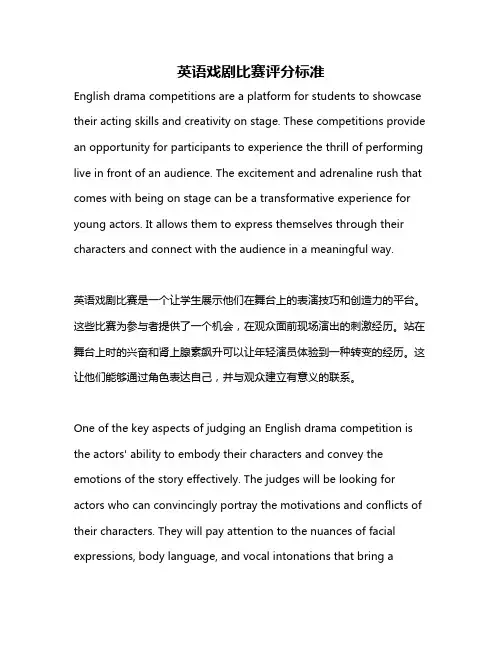
英语戏剧比赛评分标准English drama competitions are a platform for students to showcase their acting skills and creativity on stage. These competitions provide an opportunity for participants to experience the thrill of performing live in front of an audience. The excitement and adrenaline rush that comes with being on stage can be a transformative experience for young actors. It allows them to express themselves through their characters and connect with the audience in a meaningful way.英语戏剧比赛是一个让学生展示他们在舞台上的表演技巧和创造力的平台。
这些比赛为参与者提供了一个机会,在观众面前现场演出的刺激经历。
站在舞台上时的兴奋和肾上腺素飙升可以让年轻演员体验到一种转变的经历。
这让他们能够通过角色表达自己,并与观众建立有意义的联系。
One of the key aspects of judging an English drama competition is the actors' ability to embody their characters and convey the emotions of the story effectively. The judges will be looking for actors who can convincingly portray the motivations and conflicts of their characters. They will pay attention to the nuances of facial expressions, body language, and vocal intonations that bring acharacter to life on stage. The ability to engage the audience and evoke an emotional response is crucial in scoring high in a drama competition.评判英语戏剧比赛的关键方面之一是演员们能否有效地扮演角色并传达故事的情感。
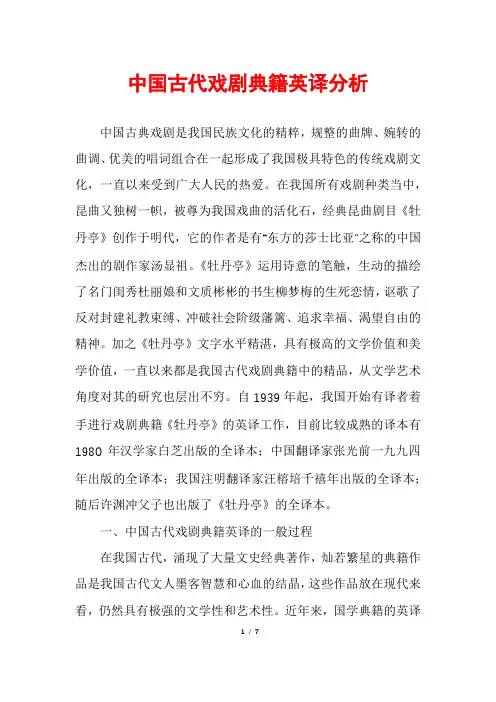
中国古代戏剧典籍英译分析中国古典戏剧是我国民族文化的精粹,规整的曲牌、婉转的曲调、优美的唱词组合在一起形成了我国极具特色的传统戏剧文化,一直以来受到广大人民的热爱。
在我国所有戏剧种类当中,昆曲又独树一帜,被尊为我国戏曲的活化石,经典昆曲剧目《牡丹亭》创作于明代,它的作者是有“东方的莎士比亚”之称的中国杰出的剧作家汤显祖。
《牡丹亭》运用诗意的笔触,生动的描绘了名门闺秀杜丽娘和文质彬彬的书生柳梦梅的生死恋情,讴歌了反对封建礼教束缚、冲破社会阶级藩篱、追求幸福、渴望自由的精神。
加之《牡丹亭》文字水平精湛,具有极高的文学价值和美学价值,一直以来都是我国古代戏剧典籍中的精品,从文学艺术角度对其的研究也层出不穷。
自1939年起,我国开始有译者着手进行戏剧典籍《牡丹亭》的英译工作,目前比较成熟的译本有1980年汉学家白芝出版的全译本;中国翻译家张光前一九九四年出版的全译本;我国注明翻译家汪榕培千禧年出版的全译本;随后许渊冲父子也出版了《牡丹亭》的全译本。
一、中国古代戏剧典籍英译的一般过程在我国古代,涌现了大量文史经典著作,灿若繁星的典籍作品是我国古代文人墨客智慧和心血的结晶,这些作品放在现代来看,仍然具有极强的文学性和艺术性。
近年来,国学典籍的英译1/ 7事业发展愈发顺利,作为国学典籍分支之一的戏剧典籍在这样的背景下,却没能得到足够的重视。
戏剧这种文学样式相比于诗词而言,更加反映世情,篇幅更长、包含的内容也更加丰富,其中《长生殿》、《西厢记》、《琵琶行》、《牡丹亭》、《桃花扇》并称为我国古代戏曲史上的五大名剧。
这些戏剧典籍既有诗词的文采雅致,又能作为古代寻常百姓喜闻乐见的娱乐方式,若能对它们进行适当的翻译,将其传播到更广阔的事业,我国古代的戏剧典籍势必能够发挥更大的光和热。
一般来说,戏剧典籍的英译需要遵循以下过程:首先翻译者需要对戏剧典籍的内容做到深刻理解。
比如对戏剧典籍《牡丹亭》的翻译,并不仅仅要翻译出杜丽娘与柳梦梅之间生死相依、可歌可泣的爱情故事,更重要的是翻译出这部作品作者想要表达的主旨——那种对自由爱情的向往,以及真情至上跨越生死的信念。
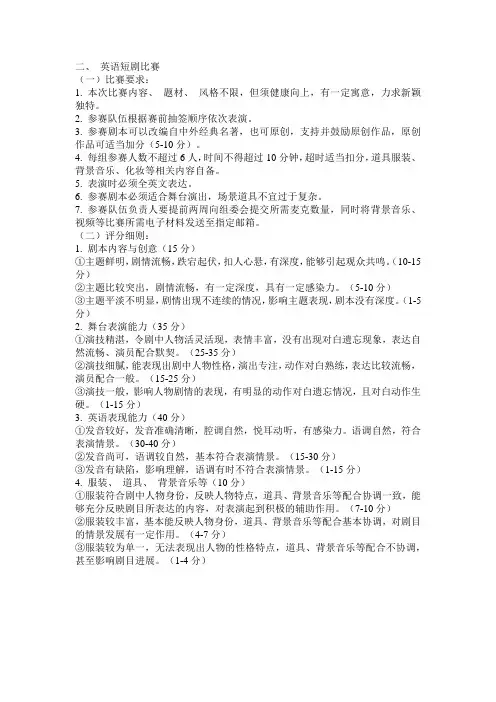
二、英语短剧比赛(一)比赛要求:1. 本次比赛内容、题材、风格不限,但须健康向上,有一定寓意,力求新颖独特。
2. 参赛队伍根据赛前抽签顺序依次表演。
3. 参赛剧本可以改编自中外经典名著,也可原创,支持并鼓励原创作品,原创作品可适当加分(5-10分)。
4. 每组参赛人数不超过6人,时间不得超过10分钟,超时适当扣分,道具服装、背景音乐、化妆等相关内容自备。
5. 表演时必须全英文表达。
6. 参赛剧本必须适合舞台演出,场景道具不宜过于复杂。
7. 参赛队伍负责人要提前两周向组委会提交所需麦克数量,同时将背景音乐、视频等比赛所需电子材料发送至指定邮箱。
(二)评分细则:1. 剧本内容与创意(15分)①主题鲜明,剧情流畅,跌宕起伏,扣人心悬,有深度,能够引起观众共鸣。
(10-15分)②主题比较突出,剧情流畅,有一定深度,具有一定感染力。
(5-10分)③主题平淡不明显,剧情出现不连续的情况,影响主题表现,剧本没有深度。
(1-5分)2. 舞台表演能力(35分)①演技精湛,令剧中人物活灵活现,表情丰富,没有出现对白遗忘现象,表达自然流畅、演员配合默契。
(25-35分)②演技细腻,能表现出剧中人物性格,演出专注,动作对白熟练,表达比较流畅,演员配合一般。
(15-25分)③演技一般,影响人物剧情的表现,有明显的动作对白遗忘情况,且对白动作生硬。
(1-15分)3. 英语表现能力(40分)①发音较好,发音准确清晰,腔调自然,悦耳动听,有感染力。
语调自然,符合表演情景。
(30-40分)②发音尚可,语调较自然,基本符合表演情景。
(15-30分)③发音有缺陷,影响理解,语调有时不符合表演情景。
(1-15分)4. 服装、道具、背景音乐等(10分)①服装符合剧中人物身份,反映人物特点,道具、背景音乐等配合协调一致,能够充分反映剧目所表达的内容,对表演起到积极的辅助作用。
(7-10分)②服装较丰富,基本能反映人物身份,道具、背景音乐等配合基本协调,对剧目的情景发展有一定作用。
英文童话剧评分标准:英文童话剧评分标准:1)口齿清晰,仪态端庄、大方,形象活泼,英语语言基本功好,符合其英语习惯;(2分)2)舞台表演过程中内容充实,突出艺术设计与表现力;(2分)3)剧本要突出艺术性,表演风趣幽默强调趣味性,在编排上应注重两者的结合;选材上要注意贴近生活,体现积极向上的精神风貌。
(2分)4)涉及内容广泛(如书中的英文歌曲、律动、句型、单词等)(2分)5)避免表演过于成人化,应着重体现出少年儿童天真活泼的个性。
(2分)评分细则1)遗忘:在比赛中,每出现一次遗忘现象,根据不同程度,扣0.1-0.5分;2)服装、饰物:服装、饰物搭配不当或与演员角色不符,扣0.1-0.5分;搭配突出,能表现出角色性格,加0.1-0.3分;3)时间: 情景剧表演不足或超出时间达1分钟者,扣0.1分;达2分钟者,扣0.2分;依此类推;4)用词:用词不恰当,过于生涩,不生动,扣0.1-0.3分;用词恰当,灵活,加0.1-0.3分;5)动作:动作死板,不能生动地表现出角色特点,扣0.1-0.3分;动作灵活,到位,加0.1-0.3分。
(评委可根据现场选手表现适当增减分数)舞蹈评分标准(10分):1、动作到位,动作和动作之间衔接自然,造型美观,符合该舞蹈的基本特点。
2、舞蹈动作符合音乐节奏的特点,节奏感强。
3、突出幼儿年龄段特征及情趣、具有民族性、艺术性和时代感。
4、动作流畅、有韵味。
5、具有一定的技巧性、技术性,良好的舞台风貌。
评分细则:1、舞蹈动作的连贯性:不能连贯准确的完成舞蹈动作扣扣0.1-0.5分(托小班难度降低)2、舞蹈的意境、情感及韵律感:音乐节奏与动作不协调扣0.1-0.5分(托小班难度降低)3、年龄;幼儿的舞蹈编排不能体现幼儿年龄特征扣0.1-0.5分(托小班难度降低)4、流畅:动作不够流畅自然扣0.1-0.5分(托小班难度降低)5、技功;不具有一定的技巧性0.1-0.5分(托小班难度降低)。
班级节目名称班级介绍
10分
整体台风
20分
舞台表现
30分
剧情构思
15分
英语发音
15分
团队参与
10分
总分
100分
09级商英1班Plants VS Zombies—Zombie Hotel 《植物大战僵尸·僵尸旅馆》
班级节目名称班级介绍
10分
整体台风
20分
舞台表现
30分
剧情构思
15分
英语发音
15分
团队参与
10分
总分
100分
09级商英4班Pleasant Goat And Big Big Wolf 《喜洋洋与灰太狼》
09级商英3班Sleeping Beauty 《睡美人》
10级商英1班Three Dozeo Of Bones The Dead Essences—《三打白骨精》
班级节目名称班级介绍
10分
整体台风
20分
舞台表现
30分
剧情构思
15分
英语发音
15分
团队参与
10分
总分
100分
10级商英2班The Love Of Two Butterflies
《梁祝》
10级国商1班The Chinese Odyssey 《大话西游》
09级商英2班Daughter Of Sea 《海的女儿》。
2007年八级水平测试西译汉参考评分标准1.出现数字、一般单词等误译、漏译,扣0.1分。
外文名字如果没有翻译,每个名字扣0.1分。
但只要译为中文,除非跟原来音节毫无关系,否则不扣分。
2.句子主要成分或内容误译,扣除全部分数。
3.时态、句型错误,扣0.2分4.同一错误不重复扣分。
5.内容翻译正确,但是中文表达欠佳,扣0.1分。
第一段:第1句:在遭受政变分子的猛烈轰炸之后,莫内达宫四面起火。
0.5分政变分子0.1分,猛烈0.1分,轰炸0.1分,莫内大宫0.1分,四面起火0.1分。
第2句:叛乱军人的步枪已经在莫兰德街街角处时隐时现。
(注意时态)0.7分叛乱军人0.1分,步枪0.1分,已经0.1分,莫兰德街0.1分,街角处0.1分,时隐时现0.2分。
第3句:他们认定要在1973年9月11日这一天抓住困守在莫内达宫中的共产党。
0.6分认定0.1分,1974年9月11日0.1分,抓住0.1分,困守0.1分,莫内达宫内0.1分,共产党0.1分。
第4句:在莫内达宫中的一间大厅里,智利依法选举产生的总统萨尔瓦多·阿连德一边用菲德尔·卡斯特罗送给他的机枪射击,(注意副动词用法)1分一间大厅0.1分,依法选举的总统0.1分,萨尔瓦多·阿连德0.1分,菲德尔·卡斯特罗0.1分,赠送0.2分,机枪0.1分,射击0.1分,一边……一边0.2分。
第5句:一边向他的医生达尼罗·巴尔图林提出了最后一个请求:0.5分医生0.1分,达尼罗·巴尔图林0.1分,提出0.1分,最后0.1分,请求0.1分。
第6句:“你是我最好的朋友。
0.2分是0.1分,最好的朋友0.1分。
第7句:如果我受了伤,你就一枪打死我(你就给我一枪)。
”0.5分如果我受了伤0.2分,一枪打死我0.3分。
共4分第二段:第1句:萨尔瓦多·阿连德是在1970年与智利共产党和其他几个小党组成联盟赢得大选的。
英文短篇电影竞赛打分准则nScoring CriteriaStoryline and Concept (30%)- Originality: The degree to which the film offers a unique and fresh perspective.- Story Development: The clarity and effectiveness of the story's n, including character development and narrative arc.- Themes and Messaging: The depth and relevance of the themes explored in the film.Directing and Technical n (30%)- n: The ability of the director to effectively tell the story, including the timing and blocking of scenes.- Cinematography: The quality of the visual storytelling, including framing, lighting, and shot n.- Sound and Editing: The overall sound quality, including dialogue, sound effects, and music, as well as the editing style and flow.Acting and Performances (20%)- Acting: The believability and depth of the performances, including the ability to convey ns and maintain character consistency.- Ensemble: The chemistry and n among the cast members.n Quality (15%)- n Value: The overall quality of the film's n, including sets, costumes, and props.- Visual Effects: The effectiveness and n of any visual effects used in the film.Audience Engagement and Impact (10%)- Creativity: The use of innovative storytelling techniques or unique filmmaking approaches.- nal Resonance: The film's ability to evoke an nal response from the audience.- Message Clarity: The effectiveness of the film in delivering its message or theme to the audience.Scoring SystemEach n will be scored on a scale of 1 to 10, with 10 being the highest. The scores from each n will then be averaged to determine the final score for each film.n。